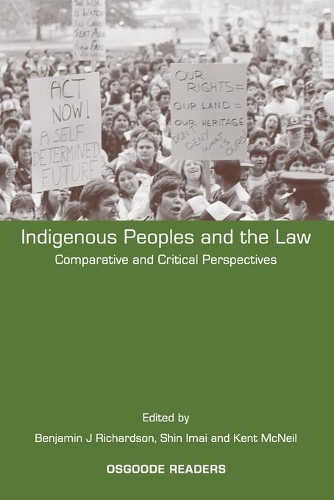
Indigenous Peoples and the Law: Comparative and Critical Perspectives
(Paperback)
Publishing Details
Indigenous Peoples and the Law: Comparative and Critical Perspectives
By (Author) Benjamin J Richardson
Edited by Shin Imai
Edited by Kent McNeil
Bloomsbury Publishing PLC
Hart Publishing
18th March 2009
United Kingdom
Classifications
Professional and Scholarly
Non Fiction
Human rights, civil rights
341.4852
Physical Properties
Paperback
446
Width 156mm, Height 234mm, Spine 22mm
880g
Description
Indigenous Peoples and the Law provides an historical, comparative and contextual analysis of various legal and policy issues affecting Indigenous peoples. It focuses on the common law jurisdictions of Australia, Canada, New Zealand and the United States, as well as relevant international law developments. Edited by Benjamin J Richardson, Shin Imai, and Kent McNeil, this collection of new essays features 13 contributors including many Indigenous scholars, drawn from around the world. The book provides a pithy overview of the subject-matter, enabling readers to appreciate the seminal issues, precedents and international legal trends of most concern to Indigenous peoples. The first half of Indigenous Peoples and the Law takes an historical perspective of the principal jurisdictions, canvassing, in particular, themes of Indigenous sovereignty, status and identity, and the movement for Indigenous self-determination. It also examines these issues in an international context, including the Inter-American human rights regime and the 2007 UN Declaration on the Rights of Indigenous Peoples. The second part of the book canvasses some contemporary issues and claims of Indigenous peoples, including land rights, mobility rights, community self-governance, environmental governance, alternative dispute resolution processes, the legal status of Aboriginal women and the place of Indigenous legal traditions and legal theory. Although an introductory volume designed primarily for readers without advanced understanding of Indigenous legal issues, Indigenous Peoples and the Law should also appeal to seasoned scholars, policy-makers, lawyers and others who are knowledgeable of such issues in their own jurisdiction and wish to learn more about developments in other places.
Reviews
This collection is effective at providing an introduction to common lae legal issues facing Aboriginal peoples and it also can serve as a springboard for more advanced study. These chapters are highly informative works which examine law as it applies to Indigenous peoples in the following locations: Canada, the United States of America, Australia, New Zealand, Central and South America, and international law and policy elsewhere. The benefit of these articles is twofold. First, the authors hit on many of the major legal issues that Aboriginal people face in each location. The peculiarities in each location show a variety of outcomes from the colonial experience to date and provide valuable points of contrast to the Canadian experience. The second benefit, and one which applies to the entire book, is that the articles are extensively referenced, a habit of citation which is especially helpful to others studying unfamiliar jurisdictions. I highly recommend this book for anyone interested in studying indigenous legal issues. Whether it is read cover to cover or simply used as a reference for further research, there is something for everyone. It would be a perfect text selection for a course in Native law and I intend on using it in my own upcoming undergraduate courses. -- D'Arcy Vermette * The Canadian Journal of Native Studies, Volume 30, No. 2 *
Author Bio
Benjamin J Richardson, Shin Imai and Kent McNeil are Professors at Osgoode Hall Law School of York University in Toronto.
